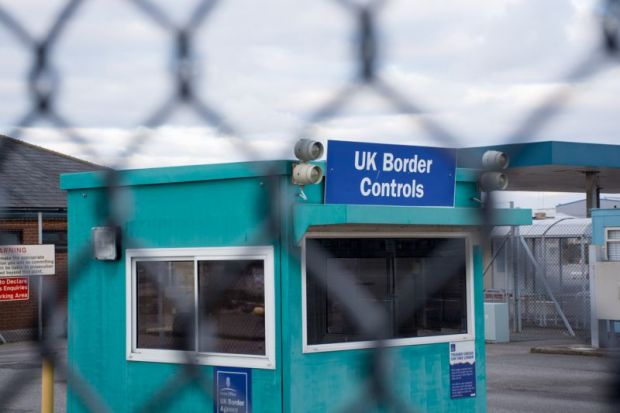If you’re trying out a new challenge this year (Veganuary? Dry January?), in all likelihood, you are counting down the 31 days of January. I too am crossing each day off the calendar but for a different reason – my visa to stay in the UK expires on 30 January.
I am an academic at the University of Cambridge and in late October last year, the Home Office decided to refuse my application for indefinite reave to remain (ILR) after a decade of studying, working, and living in the UK.
Despite international media coverage and an open letter signed by 2,000 academics, the Home Office has not yet been persuaded that they made an error of judgment in assessing my case. The situation is personally distressing – for more than two months now, I have woken up every day thinking about my visa.
The case, however, also raises wider issues about Home Office processes, the value and treatment of global researchers in the UK, and the UK’s reputation as an academic leader in the post-Brexit world.
My application for settlement in the country was refused primarily because of a single extended period of time away from the country (for details, see my tweets). I went to Delhi to conduct fieldwork for my PhD research on emerging gender and class relations in urban India. The value of my research lies in its ability to offer in-depth insights into young people’s experiences of socio-economic change, which would not have been possible without spending an extended period of time in Delhi. Indeed, this research design was central to my proposal that got me entry into Cambridge, fully funded by the Gates Cambridge scholarship.
Despite documents from the university providing evidence for the necessity of fieldwork, the Home Office contended that I had failed to provide any “exceptional reasons” for my extended time away from the UK. Without engaging with the specificities of the case, the Home Office rejected my application on the basis of technical calculation of absences from the country. While this is not entirely surprising, it needs to be emphasised that the negligent decisions made by Home Office case workers have serious implications for people’s lives.
My case is not even the first of its kind (and I’m afraid to say that it also does not seem like it will be the last). In recent years, many other academics and their dependents have been on the receiving end of the Home Office’s poor decision-making.
In 2017, Emily Michelson was denied indefinite leave to remain because she had spent a year on a fellowship in Italy despite her employer, University of St Andrew’s, providing a letter to substantiate that this was an essential aspect of her work. In 2018, Ernesto-Schwartz-Marin similarly had his application for indefinite leave to remain refused after a decade of living in the UK because he had spent time working in Mexico.
The university assisted me with the application and provided evidence clearly stating that I was approved for “Leave to work away” for my research in Delhi and that this was an essential part of my PhD. I, therefore, had no reason to contemplate the possibility of the situation that I now find myself in. In both Dr Michelson’s and Dr Schwartz-Marin’s cases, the Home Office eventually made “exceptions” and granted them ILR.
Following their cases and repeated commitment to “global Britain”’ by Conservative leaders, the Home Office finally accepted the principle that research-related work should not count towards absences from the country. However, in keeping with its general arbitrariness, it decided to translate this into policy only for those on Tier 2 visas for skilled workers. Not applying the same principle to those, like me, applying for settlement under the 10-years-long residence route fails all tests of reasonableness.
In the third month of challenging this unfair decision, as I count down the very few days left before my current visa expires, I am still waiting to hear from the Home Office. How is it that the Home Office can decide to exercise discretion in certain cases but not others?
I am being supported in my call to the Home Office to reconsider this decision by many colleagues, Cambridge MP Daniel Zeichner, and now the University and College Union too. The overwhelming concern underlying this support is about the increasingly hostile environment that academics are facing in the UK despite the government’s rhetoric about retaining the “brightest and the best” talent.
Another deadline this month is when the UK formally leaves the European Union. In post-Brexit Britain, EU staff will be subject to immigration control too. Coupled with the hostility that non-EU migrants have historically faced and continue to face, this raises serious questions about the future of academia in the UK. Are we headed towards becoming a myopic society that is apathetic to global issues and its own place in the world? If we find that concerning, we cannot let poor treatment of migrant staff become normalised. I encourage you to write to your MP, demand a response from the Home Secretary and hold this government accountable for how it is treating foreign academic researchers.
Asiya Islam is a junior research fellow at Newnham College, University of Cambridge.
Register to continue
Why register?
- Registration is free and only takes a moment
- Once registered, you can read 3 articles a month
- Sign up for our newsletter
Subscribe
Or subscribe for unlimited access to:
- Unlimited access to news, views, insights & reviews
- Digital editions
- Digital access to THE’s university and college rankings analysis
Already registered or a current subscriber?




